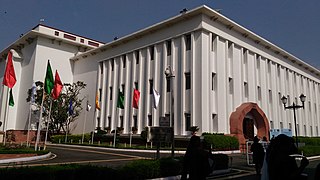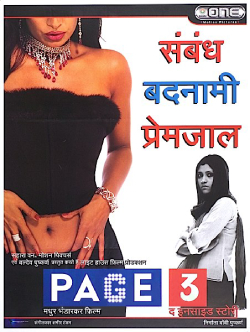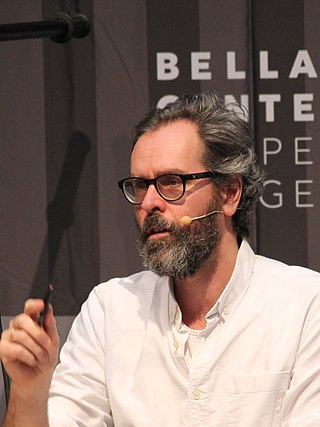Related Research Articles

A tabloid is a newspaper with a compact page size smaller than broadsheet. There is no standard size for this newspaper format.

The Independent is a British online newspaper. It was established in 1986 as a national morning printed paper. Nicknamed the Indy, it began as a broadsheet and changed to tabloid format in 2003. The last printed edition was published on Saturday 26 March 2016, leaving only the online edition.
Page 3, or Page Three, was a British newspaper convention of publishing a large image of a topless female glamour model on the third page of mainstream red-top tabloids. The Sun introduced the feature in November 1970, which boosted its readership and prompted competing tabloids—including the Daily Mirror, the Sunday People, and the Daily Star—to begin featuring topless models on their own third pages. Well-known Page 3 girls included Linda Lusardi, Samantha Fox and Katie Price.

The Daily Mirror is a British national daily tabloid newspaper. Founded in 1903, it is owned by parent company Reach plc. From 1985 to 1987, and from 1997 to 2002, the title on its masthead was simply The Mirror. It had an average daily print circulation of 716,923 in December 2016, dropping to 587,803 the following year. Its Sunday sister paper is the Sunday Mirror. Unlike other major British tabloids such as The Sun and the Daily Mail, the Mirror has no separate Scottish edition; this function is performed by the Daily Record and the Sunday Mail, which incorporate certain stories from the Mirror that are of Scottish significance.

Bildlit. 'Picture' or Bild-Zeitung, lit. 'Picture Newspaper' is a German tabloid newspaper published by Axel Springer SE. The paper is published from Monday to Saturday; on Sundays, its sister paper Bild am Sonntag is published instead, which has a different style and its own editors. Bild is tabloid in style but broadsheet in size. It is the best-selling European newspaper and has the sixteenth-largest circulation worldwide. Bild has been described as "notorious for its mix of gossip, inflammatory language, and sensationalism" and as having a huge influence on German politicians. Its nearest English-language stylistic and journalistic equivalent is often considered to be the British national newspaper The Sun, the second-highest-selling European tabloid newspaper.

The Daily Star is a daily tabloid newspaper published from Monday to Saturday in the United Kingdom since 2 November 1978. On 15 September 2002 a sister Sunday edition, Daily Star Sunday was launched with a separate staff. On 31 October 2009, the Daily Star published its 10,000th issue. Jon Clark is the editor-in-chief of the paper.

The Sunday Sport is a British tabloid newspaper that was founded by David Sullivan in 1986. It mainly publishes images of topless female glamour models, and is well-known for publishing sensationalised, fictionalised, and satirical content, alongside celebrity gossip and sports coverage. It has changed from including legitimate journalism throughout its history. A sister title, the Daily Sport, was published from 1991 to 2011, when it ceased publication and went online-only, under separate ownership.

Newsday is an American daily newspaper that primarily serves Nassau and Suffolk counties on Long Island, although it is also sold throughout the New York metropolitan area. The slogan of the newspaper is "Newsday, Your Eye on LI", and formerly it was "Newsday, the Long Island Newspaper". The newspaper's headquarters is in Melville, New York, in Suffolk County. Newsday has won 19 Pulitzer Prizes and has been a finalist for 20 more.

Mumbai Mirror was an English-language newspaper that was initially launched in 2005 by the Times Group as part of a ringfencing tactic to fight emerging competition in the city, mainly from Zee–Bhaskar's then joint newspaper, Daily News and Analysis. Mumbai Mirror was downsized and digitised by its owners at The Times Group on 5 December 2020 during the Covid-19 lockdown.

Tabloid journalism is a popular style of largely sensationalist journalism which takes its name from the tabloid newspaper format: a small-sized newspaper also known as half broadsheet. The size became associated with sensationalism, and tabloid journalism replaced the earlier label of yellow journalism and scandal sheets. Not all newspapers associated with tabloid journalism are tabloid size, and not all tabloid-size newspapers engage in tabloid journalism; in particular, since around the year 2000 many broadsheet newspapers converted to the more compact tabloid format.

Palya Lankesh was an Indian poet, fiction writer, playwright, translator, screenplay writer and journalist who wrote in the Kannada language. He was also an award-winning film director.

Telugu cinema, also known as Tollywood, is the segment of Indian cinema dedicated to the production of motion pictures in the Telugu language, widely spoken in the states of Andhra Pradesh and Telangana. Telugu cinema is based in Film Nagar, Hyderabad. As of 2021, Telugu cinema is the largest film industry in India in terms of box-office. Telugu films sold 23.3 crore tickets in 2022, the highest among various film industries in India. The first Telugu talking feature film, Kalidas, a multilingual directed by H. M. Reddy was released on 31 October 1931.

The National Film Awards is the most prominent film award ceremony in India. Established in 1954, it has been administered, along with the International Film Festival of India and the Indian Panorama, by the Indian government's Directorate of Film Festivals since 1973.

Page 3 is a 2005 Indian Hindi-language drama film directed by Madhur Bhandarkar and produced by Bobby Pushkarna and Kavita Pushkarna about the Page 3 culture and media in the city of Mumbai. It stars Konkona Sen Sharma, Atul Kulkarni, Sandhya Mridul, Tara Sharma, Anju Mahendru, and Boman Irani. The film won three National Film Awards, including the Golden Lotus Award for Best Film.

Madhur Bhandarkar is an Indian film director, script writer, and producer. In 2016, Bhandarkar was honoured with the Padma Shri, the fourth highest civilian honour, by the Government of India.

Anders Morgenthaler is a Danish comics artist, children's book author, animator and film director.
A middle-market newspaper caters to readers who like entertainment as well as coverage of important news events. Such newspapers are the middle segment of a continuum of journalistic seriousness – upper-market or "quality" newspapers generally cover hard news, and down-market newspapers favour sensationalist stories.

The Guardian is a British daily newspaper. It was founded in 1821 as The Manchester Guardian, before it changed its name in 1959. Along with its sister papers, The Observer and The Guardian Weekly, The Guardian is part of the Guardian Media Group, owned by the Scott Trust Limited. The trust was created in 1936 to "secure the financial and editorial independence of The Guardian in perpetuity and to safeguard the journalistic freedom and liberal values of The Guardian free from commercial or political interference". The trust was converted into a limited company in 2008, with a constitution written so as to maintain for The Guardian the same protections as were built into the structure of the Scott Trust by its creators. Profits are reinvested in its journalism rather than distributed to owners or shareholders. It is considered a newspaper of record in the UK.

Roar News is the student newspaper of King's College London. It is editorially independent of both the university and the students' union.
No More Page 3 was a campaign that ran in the United Kingdom from 2012 to 2015, aimed at convincing the owners and editors of The Sun to cease publishing images of topless glamour models on Page 3, which it had done since 1970. Started by Lucy-Anne Holmes in August 2012, the campaign represented Page 3 as an outdated, sexist tradition that demeaned girls and women. The campaign collected over 240,000 signatures on an online petition and gained support from over 140 MPs, a number of trade unions, over 30 universities, and many charities and advocacy groups.
References
- 1 2 Bollywood director eyes 'tabloid' culture BBC News, 30 July 2004.
- ↑ "Page 3 is socially relevant". The Times of India. India. 5 August 2008.
- 1 2 "Striking a new balance on Page 3". The Indian Express. India. 11 February 2005.
- ↑ "Page 3 culture. Why not?". The Hindu . India. 30 June 2005. Archived from the original on 10 November 2012.